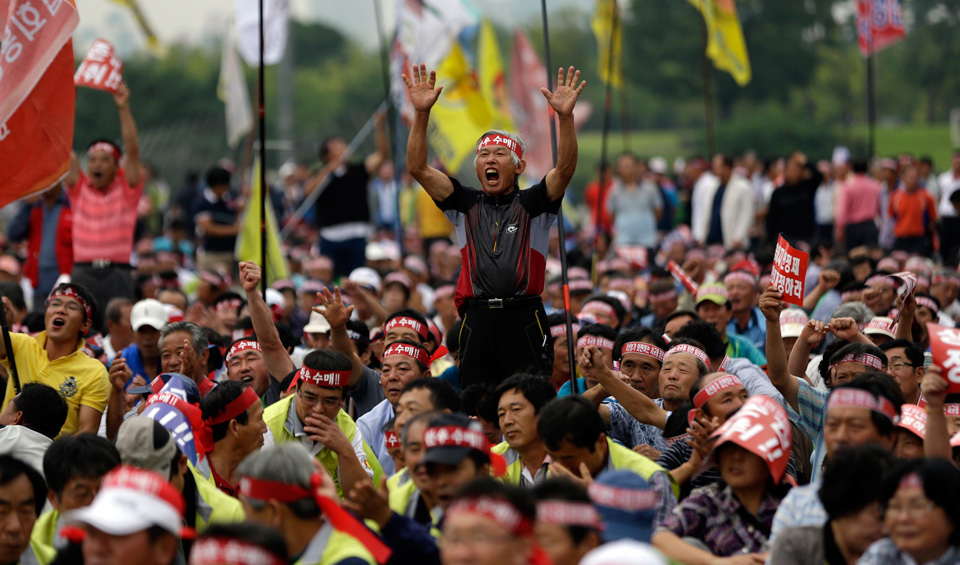
ST. LOUIS—International trade unionists, meeting in St. Louis while attending the AFL-CIO Convention, agreed on the harms to workers from so-called “free trade” pacts worldwide, but left their session on the future of neoliberal trade still searching for ways to reverse the damage.
The October 22 discussion at the Global Labor Symposium, hosted by AFL-CIO trade economist Celeste Drake, featured unionists from Quebec, Tunisia, Korea, and elsewhere outlining the harms not just to unions but to workers from the pacts, starting with the infamous U.S.-Canada-Mexico pact, NAFTA, 25 years ago.
And the damage isn’t over. Caroline Sceneville, first vice president of the Quebec Labor Federation, reported that after U.S. unionists and their allies forced the Obama and Trump administrations to dump the latest infamous pact, the Trans-Pacific Partnership, the other 11 Pacific Rim nations are trying to resurrect it. That includes Canada, she said.
“We share a critique,” Drake said. “These pacts are about freedom and power for transnational companies, not about freedom to organize.”
“These free trade agreements are based on the exploitation of the working class and increase the disparities of wealth distribution” within nations and worldwide, Sceneville added.
And Korean Confederation of Trade Unions (KCFTU) International Director Ryu Mikyung said the nine-year-old South Korea-U.S. free trade agreement “didn’t create jobs in Korea.” Instead, “It was used by transnational corporations to suppress workers’ rights in Korea,” with government cooperation.
Studies repeatedly show multinational corporations use the “free trade” pacts, which cover a lot more than trade, to decamp from developed nations with decent wages and labor standards—uch as the U.S. and Canada—in favor of low-wage nations with no worker rights, few job safety and health protections, no environmental rules, and virtually no enforcement.
As a result of the offshoring to such nations as China, Mexico, India, and the Philippines, U.S. factory and call-center workers have lost at least 1 million jobs in the years since NAFTA began, U.S. Labor Department data show. Canada lost an estimated 66,000 factory jobs.
The pacts are so lopsidedly pro-corporate, said KCFTU’s Ryu Mikyung that when South Korea’s National Assembly proposed banning supermarket workers from toiling on Sundays, the multinational supermarket chains there challenged the ban “as a violation of” the trade pact.
Several delegates proposed solutions to the “trade pact” problem:
“It’s a necessity for international unions to insist on including a social clause” in every trade pact’s text,
Sceneville said. Such a clause would not only write a strong enforceable right to organize and bargain into an agreement’s text, but would also include protections of national cultures and cultural rights against domination and eradication by transnational corporations.
Through an interpreter, Tunisian General Labor Union General Secretary Noureddine Taboubi said unions should work within the system. “A strong and visible and proactive presence of labor unions in formulating, shaping, and structuring trade agreements will have a positive impact in shaping the life of the working class,” he contended.
Korea’s Ryu Mikyung said unions must “try to put more energy into holding transnational corporations accountable” not just for their own conduct, but for mistreatment of workers in firms that are in their supply chains.
“We need to talk about united actions” across national lines, “and organized actions and think about demands for social development that goes along with development of trade,” said another, unidentified, delegate in Spanish, speaking at a floor microphone through a translator.
Taboubi summed up the consensus position of the impact of such trade agreements. “Free trade has been accompanied by economic and social chaos,” he said.












Comments